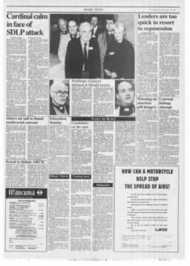Page 10, 14th February 1992
Page 10

Report an error
Noticed an error on this page?If you've noticed an error in this article please click here to report it.
Tags
Share
Related articles
Shrine That Survived Cromwell's Edict
Inquisition Naiveity Or Heresy?
Falling Birth Rates Undermine The Sacrament Of Marriage
The Valleys Without Their Chapels
No Tears At The Thatcher Farewell
Memory loss on the Costa Bureaucratica
THOUGHTS FROM A WELSH PARISH
St Robert's Presbytery Coronation Street Aberkenfig Mid Glamorgan. IN THESE weeks before the next general election, most politicians lapse into selective memory loss. But here in Wales memories are long.
Who was that recent prime minister who said: "No one would have remembered the Good Samaritan if he'd only had good intentions. He had money as well"?
Here in Wales there have been very few good Samaritans for many years and very little money.
The. poorest people in Britain are the Welsh. In a recent report The Henley Centre, a research consultancy, studied incomes in 322 areas in Britain. Wales came
bottom of all the areas. And in Wales, Mid-Glamorgan was last of all.
That means that people living in Mid-Glamorgan have less to spend or invest than anyone else in Britain. In. fact disposable income in Mid-Glamorgan is lower than it is in Hong Kong, Singapore and Costa Rica for example.
Added to this, one person in three in Mid-Glamorgan (Wales' largest county in population) leaves school with no qualifications of any kind. This is twice as bad as the average figure in England. It is very difficult to motivate children when all they see at the end is unemployment with no advantage to be gained from qualifications.
Wales is a country where industry has almost disappeared, a whole generation has had no work of any kind. Of the core working population 45 per cent are women. Of these 42 per cent are part-time.
Young people are being dumped, like rubbish, in town and country.
Wales has shrivelled up into a Costa Bureaucratica in the south and a Costa Geriatrics in the north and in between sheep, holiday homes, reservoirs and folk museums, where there used to be communities.
By the end of this year the European Community will become a single market. In parallel with this, the community has been moving inexorably to closer political integration and decentralisation of power.
The one state which is trying to stand outside this process is Britain, now the most highly centralised and least democratic state in Europe.
Thus the status of Wales (and Scotland) remains untouched, politically a European backwater. A marginalised and poor peripheral region without any control over the conditions of its life and without any representation in European institutions.
1992 will be a year of great significance for Europe. May it also mark a new beginning for Europe's oldest nation.
Fr John Owen
blog comments powered by Disqus











